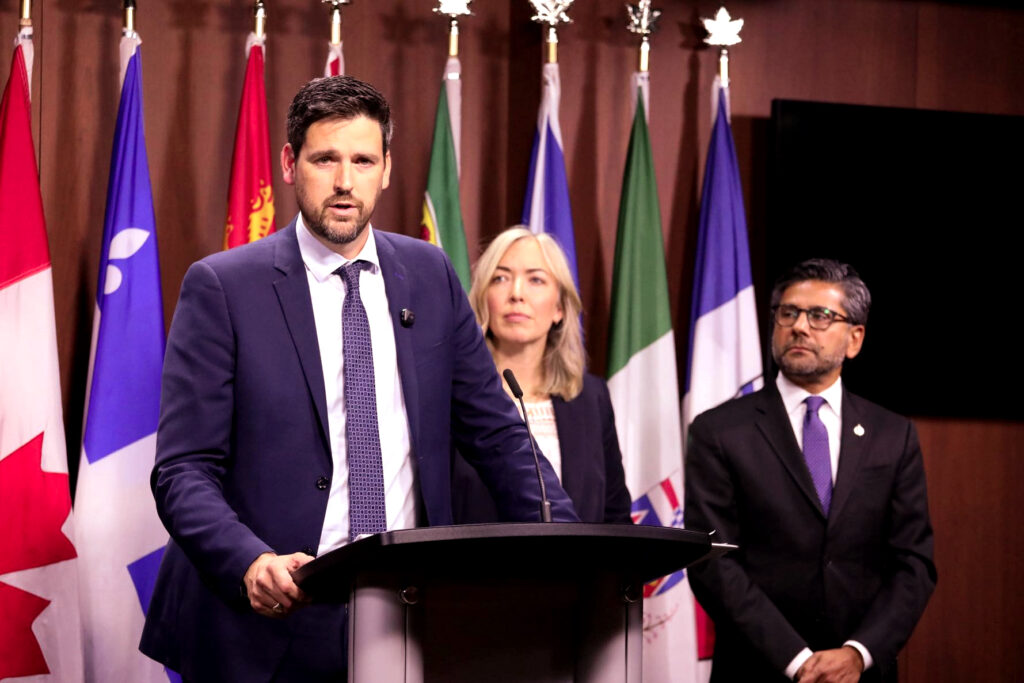‘It’s a direct attack on Bill 21,’ says Quebec’s Secularism Minister Jean-François Roberge
Provincial leaders from Quebec and other parts of the country reacted poorly last week after federal Justice Minister Sean Fraser announced that the Liberal government is asking the Supreme Court of Canada to set limits on how the Canadian Charter of Rights and Freedom’s “notwithstanding” clause is used to override conflicting provincial laws.
“As Attorney General of Canada, I have filed a factum with the Supreme Court of Canada outlining Canada’s position on constitutional issues raised by the use of the notwithstanding clause,” Fraser said in a statement.
“The Canadian Charter of Rights and Freedoms is a pillar of our democracy and a reflection of our shared values,” he said. “It guarantees fundamental freedoms, including freedom of thought, belief, expression, religion, and association.
Decision’s lasting impact

“It also guarantees equality before the law, and the right to life, liberty and security of the person. The Charter protects these rights for everyone in Canada, and they are at the heart of our democratic society.
“This case is about more than the immediate issues before the Court,” Fraser added. “The Supreme Court’s decision will shape how both federal and provincial governments may use the notwithstanding clause for years to come.”
The notwithstanding clause has proven to be controversial since its inclusion in the Charter of Rights, which was part of the Constitution of Canada enacted by Prime Minister Pierre Elliott Trudeau’s Liberal government in 1982. The clause was included as a political compromise to obtain the support of the provinces for the constitution and charter.
Deal broke a deadlock
The inclusion of the clause is widely viewed by political scientists and analysts today as a deal struck to break a deadlock between the federal government and the provinces during the constitutional negotiations, allowing legislatures to pass laws that temporarily override certain Charter rights if necessary.
Some, but not all, Charter rights are subject to the notwithstanding clause. The clause authorizes governments to temporarily override the rights and freedoms in sections 2 and 7 through 15 for up to five years, subject to renewal.
The notwithstanding clause has been used most often by Quebec to justify legislation deemed necessary to safeguard the French language, as well as by Alberta, which invoked notwithstanding to enshrine a definition of marriage as being exclusively heterosexual.
‘Attack on Bill 21,’ says CAQ
In Quebec within just a few hours of Fraser’s announcement, members of the Coalition Avenir Québec government weren’t mincing words when reacting to Ottawa’s intervention – especially regarding its potential impact on Bill 21, the province’s “religious symbols” secularism law.
Quebec Justice Minister Simon Jolin-Barrette accused the federal government of not only attacking Quebec, but also of attacking the parliamentary sovereignty of the legislative assemblies of all of Canada.
“They want to break the deal that they had,” Jolin-Barrette told journalists in Quebec City, alluding to the federal government’s original intention for including the notwithstanding clause.
Quebec’s Secularism Minister Jean-François Roberge, went further, accusing the Carney government of hypocrisy.
He said the federal government claims to not be against the secularism law, while opposing the measure put in place to safeguard it. “It’s a direct attack on Bill 21,” he said. In a statement, Fraser emphasized that his request for limits is not only about Quebec’s secularism law,
‘Overreach,’ says Ontario’s Ford
In Ontario, Premier Doug Ford warned that Ottawa’s bid to curb the province’s use of notwithstanding would be an overreach his government would not tolerate, as he also maintained that provincial governments have the full political backing of voters.
“It’s way overreach with the courts,” Ford told The Toronto Star. “Again, parliament – federal parliament, provincial parliament – they’re supreme because the people are supreme, not judges ruling on stuff that shouldn’t even be in front of the courts.”
Jolin-Barrette appeared to agree with Ford. “These people have been elected by people of each province,” he said, while maintaining that the federal government was trying to use a back door in its arguments to try and rob the provincial legislatures of their powers.



